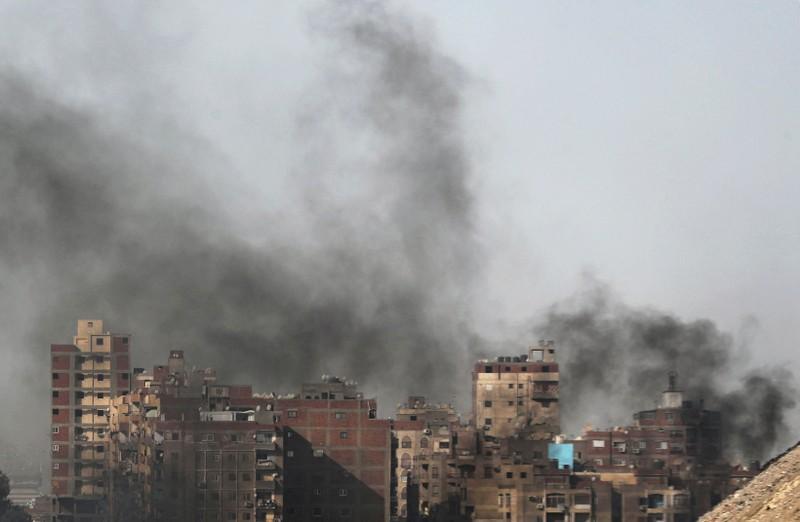A barge transporting 244 tons of diesel fuel on the Nile leaked around 110 tons of its cargo into the river near Aswan on Sunday. The barge belongs to the state-owned Nile Company for River Transport.
The following day an oil tanker truck, belonging to the private Co-op Petroleum Company, is reported to have swerved off the road and fallen into an irrigation canal near the City of Sohag on Monday, spilling another 40 tons of fuel–20 tons of diesel and 20 tons of petroleum.
Authorities claim that these spills have been contained, yet concerns still abound regarding the safety measures in place to avert such disasters in the future. An official from the Ministry of Irrigation, whose name is withheld as he is not authorized to speak to the media, told Al-Masry Al-Youm that “the flow of both spills has been prevented.”
While the official could not comment on the tanker spill in Beleina, Sohag, media reports indicate that the 40 tons of fuel leaked into the Kasra Irrigation Canal have been contained.
Kasra (around 470km south of Cairo) reportedly does not flow into the Nile, or into any other irrigation canals. Sohag's water purification plants have not been affected by this accident, according to governorate officials.
Commenting on the spill from the barge, the official said, “the Ministry of Irrigation, together with local authorities in the Governorates of Aswan and Luxor temporarily shut down water purification plants along the affected areas of the Nile until the spill could be contained.” He added that “the problem was resolved on Monday, and people from Aswan to Luxor may now safely drink from their tap water.”
“The spill that took place in Aswan [around 900km south of Cairo] was contained in Esna, Luxor [around 750km south of Cairo], and the fuel is no longer flowing northwards,” the official continued.
Al-Masry Al-Youm's correspondent in Luxor, Ibrahim Muawad, confirmed that “most of the spill was contained in Southern Luxor, between the old dam and new dam in Esna.” He added that the Governorates of Aswan and Luxor, together with the Egyptian Environmental Affairs Agency, the Ministry of Irrigation, and water companies swiftly moved to ensure the spill did not leak into water purification plants.
“Only a very small amount of diesel has managed to escape and flow northwards from Esna. But this is apparently an insignificant trickle,” said Muawad.
On Sunday and Monday, people in Aswan and Luxor were extremely worried regarding the ramifications of the diesel spill, Muawad added. “Here in Esna, local residents stocked-up on well water. People were afraid to drink potentially polluted water, or to consume potentially contaminated fish.”
Tap water was reportedly cut-off for five to six hours in Esna on Monday. "Locals are still skeptical about the purity and quality of their tap water,” said Muawad.
Egypt's stretch of the Nile is equipped with 44 river ports, and ten docks. Eight of these ten river docks are utilized in loading and unloading petroleum products. The government of Prime Minister Ahmed Nazif recently announced plans to expand Nile transport by increasing the number of commercial transport boats and barges operating on the river, along with the construction of additional ports and docks.
In August Nazif inaugurated two barges intended for transporting grain and food stuffs from Northern Egypt to its southern Nile ports.
The government announced its plans to resort to Nile transport as a means of increasing transport efficiency and decreasing pollution. The Nazif cabinet wants to expand Nile transport from Alexandria to Aswan–to account for five percent of Egypt's total transport, instead of its current rate of one percent.
According to its studies, one large barge may transport the equivalent loads carried by 30 to 50 trailer trucks. This plan also aims to reduce pressures and traffic accidents along Egypt's roads and highways.
Critics of this plan point to the possibility increased river transport will result in increased levels of pollution in the Nile. “The information available to us from governmental sources regarding the diesel leakage in the Nile near Aswan is unclear," Mohamad Nagi, of the independent Habi Center for Environmental Rights, told Al-Masry Al-Youm. "In any case there are clearly not enough safety measures available to prevent such a spill from re-occurring. Those responsible for the spill must be held accountable, and those affected by it must be compensated.”
According to Law 48/1982, which serves to address the protection of Egypt's Nile from pollution, oil spills in Egypt's seas are punishable by fines ranging from LE300,000 to LE1 million, while oil spills in the Nile are punishable by fines ranging from just LE5000 to LE20,000.
According to Nagi, “there are numerous oil spills associated with the transportation of petroleum products via the Red Sea and Suez Canal; most recently the mysterious oil spill which took place near Hurghada in late June.”
These spills are said to have harmed marine life and tourism. “But petroleum transport via the Nile represents a pending disaster on a much larger scale. The Nile is the principle source of drinking water and food, in terms of agriculture and fishing, for Egyptians, and it must be considered a red line in terms of transporting petroleum products,” Nagi said.
Nagi added that the transportation of petroleum products via the Nile should be outlawed, “except in emergency situations when roads, or land transport are inaccessible.” He argued against the removal of all petroleum depots or docks along the Nile.
“The use of boats and barges to transport grain and food along the Nile is acceptable, even though such transport may result in limited leaks from machinery, and waste being dumped into the river," said Nagi. "But the use of such boats and barges in the transport of petroleum, fuel, or other toxic products is neither acceptable, nor environmentally sustainable.”

